OER Festival in Berlin – How An Open Event Inspires Open Educational Activities in Germany
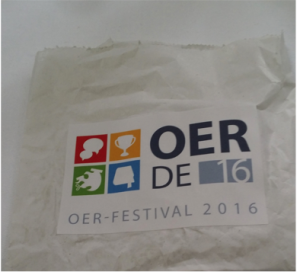 Last week the OER community celebrated its first OER Festival in Berlin which consisted of an OER Camp and an OER conference/forum (here is the German website). After the successful OER13 and OER14 conferences in Germany, the goal was to broaden and intensify the debate about OER with relevant stakeholders. In this regard, two additional OER projects are worth mentioning as they are funded by the German government and targeted at “Mapping OER” and synthesising affordances and requirements for infrastructure on which OER-related systems can be built and integrated (feasibility study). These projects have then led to a call for proposals from the Federal Ministry of Education and Research for (1) building and establishing a centre for information (and support) related to OER and (2) training for multipliers.
Last week the OER community celebrated its first OER Festival in Berlin which consisted of an OER Camp and an OER conference/forum (here is the German website). After the successful OER13 and OER14 conferences in Germany, the goal was to broaden and intensify the debate about OER with relevant stakeholders. In this regard, two additional OER projects are worth mentioning as they are funded by the German government and targeted at “Mapping OER” and synthesising affordances and requirements for infrastructure on which OER-related systems can be built and integrated (feasibility study). These projects have then led to a call for proposals from the Federal Ministry of Education and Research for (1) building and establishing a centre for information (and support) related to OER and (2) training for multipliers.
The OER Camp in Germany was based on an innovative format called BarCamps: these camps are participant-driven conferences, in which attendees share and learn in an open informal environment. Unlike traditional conferences that pre-schedule a programme, BarCamps rely on input from attendees to create the session programme on the spot and collaborate ad hoc on emerging topics.
Since 2012, several such camps have taken place in Bremen, Bielefeld and Berlin. On top of the ad hoc sessions, some workshops are offered by the members of the emerging OER Camp, who are practitioners and educators in media for education, adult educators, school teachers, researchers, policy-makers, educational publishers, and OER advocates.
The main goals of the OER Camp are to:
- Network and connect stakeholders across diverse educational domains
- Share knowledge and expertise on OER
- Spread the word on existing as well as new initiatives
- Promote open education among educational practitioners and to decision-makers and policy-makers
Why did we choose the initiative as good practice?
The events are very participatory, incubate new ideas and attract attendees with diverse backgrounds.
Also, the OER Camp has directly or indirectly produced the following outcomes (there are more that could have been selected):
- The low threshold to initiate discussions and share knowledge has been the main driver of a growing OER grassroots community in the German-speaking countries. Several established educational platform providers for school education have started to license resources with Creative Commons.
- The event built on and strengthened an existing community on OER which has had a major influence on the growing political support for the topic in Germany, e.g. the availability of national funding for awareness raising and further education measures.
- A concise guide for teachers on the objectives behind OER, Creative Commons licenses and the main educational repositories/platforms has been developed by OER Camp participants from Austria and has been remixed and adapted to the German context
- Plans to issue an OER award were discussed openly during the OER Camp 2015 and put into practice early 2016. Also as a result of the award plans the event grew into a 2-day BarCamp and a 1-day forum involving 7 partners, 30 supporters, 272 registrations, and 109 speakers.. The organisers presented all submissions in a CC-BY licensed publication that gives a good insight into the current OER landscape.
So it has been an exciting time and a great opportunity to talk about the latest developments of OER in Germany.
- OER has been established as an important topic in contemporary education. After its slow uptake in German-speaking countries, OER has gained considerable momentum and more and more people from different sectors are now involved. What can be seen in this “OER-socialisation process” is that there is a set of shared beliefs about what OER should be, but less agreement on how we should bring about changes in the educational systems.
- Although there is growing interest in OER, the discussion on procedures to mainstream OER is at the beginning. It is an interesting process to watch as arguments like “everything that is paid by the public/state should be OER” turn out to be much more complex than initially thought.
- We are on the verge of reaching a next level as indicated by the afore-mentioned political initiatives.
Overall and to sum up this brief review, it was an inspiring OER event given the diversity of formats and the nicely orchestrated opportunities for discussions. There are exciting times ahead of us and it is in the hands of all of us to keep OER going.
—
About the authors
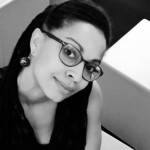 Anne-Christin Tannhäuser is a project coordinator in technology-enhanced learning and open education programmes and a consultant on educational innovation. She holds a Master’s degree in Educational Sciences and Linguistics from the University of Leipzig and she was trained at the Max Planck-Institute for Human Development, Berlin, in the use of qualitative and quantitative research methodologies. In the past seven years she has managed and contributed to several TEL initiatives at national and European levels, including for the European Foundation for Quality in E-Learning, Cooperative State University Baden-Württemberg, Knowledge Information Centre Malta, Wikimedia Germany, University of Applied Sciences Ruhrwest, Linnaeus University and the Institute of Prospective Technological Studies (European Commission) in the field of open education, recognition of open learning and evaluation/communication of R&D projects. She coordinated the Open Access journal INNOQUAL, the International Journal for Innovation and Quality in Learning, for two years. She is also an associate researcher at the Berlin campus of ESCP Europe, a private business school with six locations in the EU.
Anne-Christin Tannhäuser is a project coordinator in technology-enhanced learning and open education programmes and a consultant on educational innovation. She holds a Master’s degree in Educational Sciences and Linguistics from the University of Leipzig and she was trained at the Max Planck-Institute for Human Development, Berlin, in the use of qualitative and quantitative research methodologies. In the past seven years she has managed and contributed to several TEL initiatives at national and European levels, including for the European Foundation for Quality in E-Learning, Cooperative State University Baden-Württemberg, Knowledge Information Centre Malta, Wikimedia Germany, University of Applied Sciences Ruhrwest, Linnaeus University and the Institute of Prospective Technological Studies (European Commission) in the field of open education, recognition of open learning and evaluation/communication of R&D projects. She coordinated the Open Access journal INNOQUAL, the International Journal for Innovation and Quality in Learning, for two years. She is also an associate researcher at the Berlin campus of ESCP Europe, a private business school with six locations in the EU.
Dr. Markus Deimann, has since September 2013 been Assistant Professor (Akademischer Rat) in the Department of Instructional Technology and Media at FernUniversität Hagen. He completed his studies of Educational Sciences and Political Sciences at the University of Mannheim. Afterwards he worked as Research Assistant on the Project BMBF “Mulitmediales Fernstudium has been Medizinische Informatik (MEDIN)” (Multimedia-based Distance Study Medical Computer Science) at the Technische Universität Ilmenau (Ilmenau University of Technology) and at the University of Erfurt. Furthermore, he was a Visiting Scholar at the Florida State University, Tallahassee (USA) for one year. In 2011 he was a Scholarship Holder at the Open University (UK) for three months.
** (Part of this column was published in http://project.idea-space.eu/2016/03/02/oercamps/)**
 Open Education Working Group
Open Education Working Group 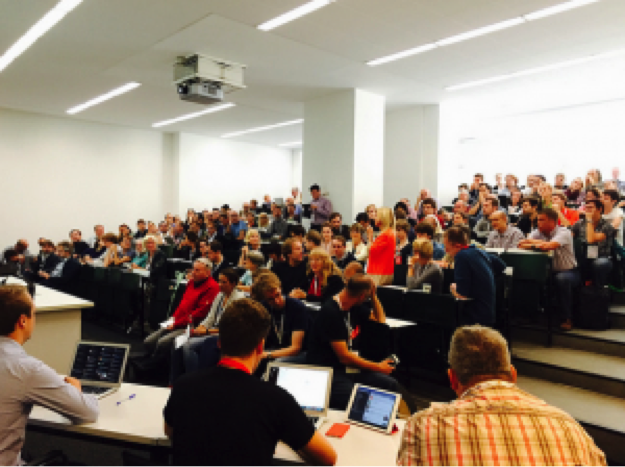
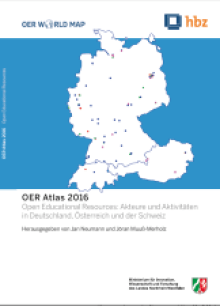
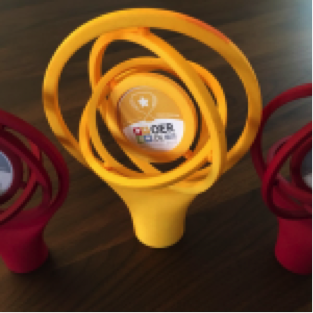
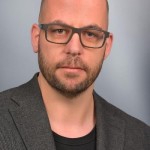




Nice work, thank you for this text!
One small correction: The OERcamp has never been to Bielefeld. In 2011 there was an EduCamp in Bielelfeld. I’d would consider this meeting in 2011 as a spark that ignited the debate on OER in Germany. But it was not an OERcamp back than. 🙂
[…] “OER has been established as an important topic in contemporary education. After its slow uptake in German-speaking countries, OER has gained considerable momentum and more and more people from different sectors are now involved. … Although there is growing interest in OER, the discussion on procedures to mainstream OER is at the beginning.” Anne-Christin Tannhäuser und Markus Deimann, Open Education Working Group, 17. März 2016 […]